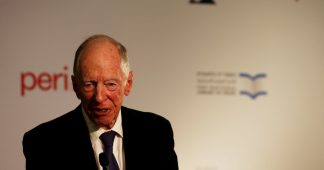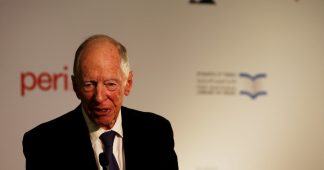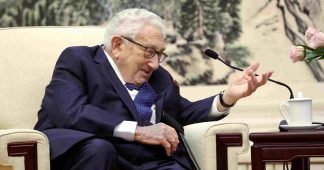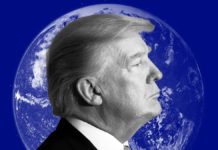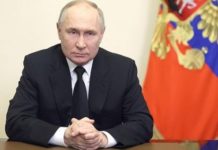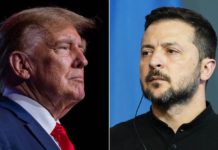By William Mallinson
Dec. 8, 2020
photo:
Spc. Hubert Delany III | US Army
Introduction
There is currently a great deal of speculation, some of it emotional and dramatic, by all manner of political theorists and international relations pundits about ‘world disorder’, and a concomitant attempt to set up a world government, or at least to control as much as possible. Some even think that the next world war is being prepared, in order to achieve this, just as the Great War led to the League of Nations, and the next one to the United Nations. Many opine that the current Covid fear being manufactured and spread by Big Media, as well as by Big Pharma, Microsoft and Google (owned by Alphabet) et al is part of this plan, or at least a tool, in order to control governments, in that it tends to create a sheep-like attitude among an already complacent population, which will present itself as willing cannon-fodder in a war scenario. Let us look at this more closely.
Speed
One factor which has helped to spread fear is the increasing speed of, and dependence on, electronic communication, accompanied by the ‘Twitterisation’ of policy formulation, and one deadline after another. Rather than reflect and calmly evaluate, there is an increasing tendency to believe the messages with which we are constantly bombarded, regardless of their validity. In short, many have appinions, disguising them as opinions. One British ambassador told me that policy was now worked out ‘on the hoof’.1 Those without a Smartphone are finding it increasingly difficult to purchase various goods, and to travel, exacerbated by the various lockdowns which are leading to so many deaths through lack of medical care for non-Covid conditions, as well as to suicides and depression. Before commenting on how to understand what is happening, some thought is required on the current ‘world order’, an overworked bromide if ever there was one, since it implies that there is order, as opposed to the opposite. Perhaps the phrase ‘current situation’ would be more sensible.
Short- and long-term
The length of periods of order and disorder – and whether they are regional or global – are also relevant if we are to understand what is happening now: if we look at the last three thousand years à la Giambattista Vico’s New Science,2 we can conclude that the world has gone through periods of order and disorder. But Vico was thinking mainly of the Roman world and the disorder of the Dark Ages, which then led to order again; moreover, the disorder of the Dark Ages only seriously affected the western part of the Roman Empire, while the Eastern part continued in relative order until at least 1204. Thus he was thinking of periods of hundreds of years, in a particular part of the world, whereas current analysts tend to think only of the worldwide perceived bi-polar-induced stability of the Cold War, and then the perceived breakdown of the old system following the fall of the Berlin Wall: in other words a period of some seventy five years until now. It is therefore simplistic to talk about world disorder, when that alleged disorder is often only affecting part of the world.
Predicting: theory versus practice
Predicting is a risky business, with predictions only rarely materialising in the form intended; this is because of the vagaries of human behaviour, as well as chance. The inability to recognise the difference between theory and practice is also relevant here. Francesco Guicciardini knew this five hundred years ago: ‘To pronounce absolutely, categorically, and, as it were, by the card, concerning the things of this world, were a great mistake; for nearly all of them are marked by some singularity or exceptional quality due to difference in their circumstances, making it impossible to refer them all to the same standard. These differences and distinctions will not be found set forth in books, but must be taught by discretion.’3 He goes on to write: ‘How wide the difference between theory and practice, and how many there are who, with abundant knowledge, remember not or know not how to turn it to account! To such men their knowledge is useless, being like a treasure kept shut up in a chest on terms that it shall not be drawn upon.’ 4
Such simple common sense is currently lacking in many allegedly responsible quarters at present. But many government advisors, often from the academic world, make dangerous predictions, which are then accepted, leading to preparations for war. Political scientist Samuel Huntingdon’s ‘clash of civilisations’ scenario5 is one pertinent example. His simplistic pigeon-holing of history, riddled with sweeping statements and some inaccuracies, bowled over droves of naïve students and thrusting politicians, who naturally ended up supporting the ‘war on terror’, despite the fact that it was to a large extent western military action in Afghanistan that got the ball rolling, exacerbated by the illegal attack on Iraq.
When taken literally, theory can be dangerous, as chance and the unpredictability are not taken into account. Leo Tolstoy has something to say on this: ‘[…] only Germans are self-confident on the basis of an abstract notion – science, that is, the supposed knowledge of absolute truth. […] The German’s self-assurance is worst of all, stronger and more repulsive than any other, because he imagines that he knows the truth – science – which he himself has invented but which is for him the absolute truth.’6 Of course, it is not only Germans who may be susceptible to such thinking, but various academics who advise governments. Quite often, they recant, once they see the potential damage that the arbitrary application of their theories can cause. One example is Kennan’s containment theory, which was a prime ingredient of the Cold War cocktail. When he recanted, it was too late.
Wishful Thinking
We can see that once people, whether governments or the population at large, start believing various ideas, theories and predictions (as with Huntingdon above), they actually plan to ensure that the prediction is fulfilled. Thus the illegal attack on Iraq was supported by large swathes of, for example, the American, British and Israeli populations. Instead of supporting order, it led to instability in the Middle East, that was only partly controlled by Russia’s intervention in Syria, preventing yet another ‘coalition of the willing’ attack on the country, and then war against Iran, which could easily have escalated into a world war.
What is Order?
To start to understand what is currently happening, we need to define precisely what is meant by ‘international/world order. Some see it as a hierarchical concept, with the strongest countries at the top, with no recognition accorded to multi-polarity. This, as we see, is what the US appears to want and believe, whether Democrat or Republican. But others consider that there is a group of ‘top countries’ that balance their interests against ‘each other, a form of multi-polarity, or perhaps even heterarchy, where different hierarchies compete against each other. These views nevertheless connect to a hierarchical mindset.7 Another level of ‘world order’ is that of regional-geographical groupings, such as the EU, the Association of South East Asian Nations, and the Eurasian Economic Union on the economic front, and NATO on the military level. Then we have a universal level, such as the United Nations, and a plethora of organisations, treaties and various agreements that transcend power blocs and geography. At any event, we can see that ‘world order’ can comprise all the above concepts.
War or Peace?
So are we heading for world war, or simply worldwide wars? If the second scenario is true, then widespread war has already begun. Let us look at different factors that have caused this. First, through the eyes of mainstream America, she does not appear prepared to relinquish the predominant position which she gained by default with the break-up of the Soviet Union, a break-up which led to the NATO attack on Belgrade, the near destruction of Iraq, and – even with a revitalised Russia – the destruction of Libya. The Republican Bush Senior’s vision of a ‘New World Order’ fizzled out, perhaps because, despite his exhortation that the US take the lead in international co-operation, some of its language was too emotional and supercilious: ‘Our cause is just, our cause is moral, our cause is right’.8 A few years later, with the attack on Belgrade, a leading commentator was writing that the USA (now with a Democrat president) was ‘determined [with the UK’s strong support] to prevent the emergence of a Europe-wide security structure that could challenge its authority’,9 using NATO’S fiftieth anniversary not to bury NATO, but to expand eastwards and challenge the UN. Even Lord Carrington, ever the gentleman, criticised the Rambouillet Agreement that broke the forty-four year peace that had prevailed in Europe since the world war.10 According to Lord Wallace, it was ‘in America’s strategic interest to keep Europe weak and subservient.11
Then came the war on terror, which can be seen retrospectively as ‘a euphemism for extending US control in the world whether it is by projecting force through its carriers or building new military bases in Central Asia’.12 It can be said with reason that the US began to dismantle the international security architecture a long time before now.13 Fast forward to Trump (no space for Obama and his drones), and we have the ‘America First’ syndrome. Trump’s emphasis on ‘America First’ seems to have transmogrified, four years after his inauguration, into three strands: disengaging the U.S. from global politics, disdaining allies and befriending autocratic leaders. Whether or not Trump wanted this or not is a moot point: he recently evoked Eisenhower’s warning about the military-industrial complex: ‘I am not saying that the military agrees with me. But they, the soldiers, do. The top level of the Pentagon probably does not agree because they want nothing other than wars, allowing all these marvellous companies which manufacture bombs, aircraft and all the rest, to be happy, and to remain.’14 This does however contrast with the 2017 deal with Saudi Arabia to sell 450 billion dollar’s worth of arms. Apart from this, Trump’s America has pulled out of the nuclear deal with Iran, supports illegal Israeli territorial claims, has pulled out of various international agreements, and is fighting tooth and nail to scupper the Russia to Germany gas pipeline, confusing, in particular, its European allies.
Thus we have seen how the Trump administration has confused the world, rather than put a dampener on dangerous tendencies. To blame the enigmatic and inconsistent Trump is not however, germane since, at least ever since the assassination of President Kennedy, US presidents have been frontmen for the military-industrial complex, with their hands tied, whether or not they agree. But where does all this leave the world at the moment?
To conclude
In attempting to analyse and evaluate the likelihood of world war, we need to add two factors: the near anti-Russian and Chinese paranoia, and the EU’s inability to have an independent foreign and military policy. Both factors are inextricably linked, in that, at least since the word ‘geopolitics’ was invented, the US and Britain have fought against any serious security co-operation between Germany/Europe and Russia, the most obvious current example being the Russia-Germany Nordstream pipeline. One reason for the EU’s inability to co-ordinate its foreign and military policy is that Poland and the Baltic states are vehemently and emotionally pro-NATO and anti-Russia, thus constituting the EU’s fifth column. In contrast, French president Macron has labelled NATO ‘brain-dead’. It is the EU’s inability to stop the current instability emanating from the western world – for it is a western phenomenon – that is leading to increasing confusion, in a western world of simplistic slogans such as ‘exporting freedom’, ‘shared values’, ‘walking shoulder to shoulder’, ‘roadmap’ and ‘forces of good’,15 where common sense is thrown out of the window.
Should NATO end up in total control of the EU, and destroy the Franco-German axis on which the EU is based, then the world can expect continuing confusion in relations between states. To predict world war is risky, but to say that there are currently several wars in the world is not. In this sense, the world is already at war.
1 William Patey, former ambassador to Iraq.
2 Vico, Giambattista, New Science, translated by David Marsh, Penguin Random House UK, 2013 (first published in 1744).
3 Guicciardini, Francesco, Counsels and Reflections, translated from the Italian (Ricordi Politici e Civili) by Ninian Hill Thomson, M.A., Kegan Paul, Trench Trübner & Co., Ltd., London, 1890, 6, pp. 7-8.
4 Op. cit., Guicciardini, Counsels and Reflections, 35, pp. 21-22.
5 Mallinson, William, ‘Does the West Exist? Huntingdon Revisited’, in Images in Words: Only History Exists, Cambridge Scholars Publishing, Newcastle upon Tyne, 2018, 2019, pp. 34-7.
6 Tolstoy, Leo, War and Peace, translated by Louise and Aylmer Maude, Wordsworth Editions, 1993, p. 505.
7 Zajec, Olivier ‘L’ordre international qui vient’, Le Monde Diplomatique, Paris, November 2020.
8 Bush, George, ‘The Hard Work of Freedom’, in O’Tuthail, Gearóid, Dalby, Simon and Routledge, Paul (eds.), The Geopolitics Reader, Routledge, London and New York, 1998.
9 McCgwire, Michael, ‘Why Did We Bomb Belgrade?’, International Affairs, vol. 76, no. 1, Chatham House, London, January 2000, p. 14.
10 Ibid., p. 14.
11 Lord Wallace, ‘Repairing European and Transatlantic Institutions, The World Today, vol. 59, no. 5, Chatham House, May 2003, p. 16.
12 Cox, Michael, ‘American Power Before and After 11 September: Dizzy with Success?’, International Affairs, vol. 78, no. 2, Chatham House, January 2000, p. 274.
13 Bennis, Phyllis, ‘The United States is Undermining International Law’, Le Monde Diplomatique, Paris, December 1999,
14 Op. cit., Zajec, Olivier.
15 For example, the British Ambassador to Greece, David Madden, spoke to students at New York College, in the run-up to the attack on Iraq, about the ‘forces of good’ – meaning the British, Americans and their partners. Such puerile and shallow language, supercilious into the bargain, is hardly becoming for an educated diplomat. See Mallinson, William, Cyprus, Diplomatic History and the Clash of Theory in International Relations, I. B. Tauris, London and New York, 2010, pp. 41 and 197.
Published at russiancouncil.ru


